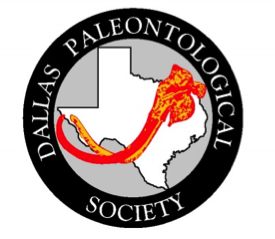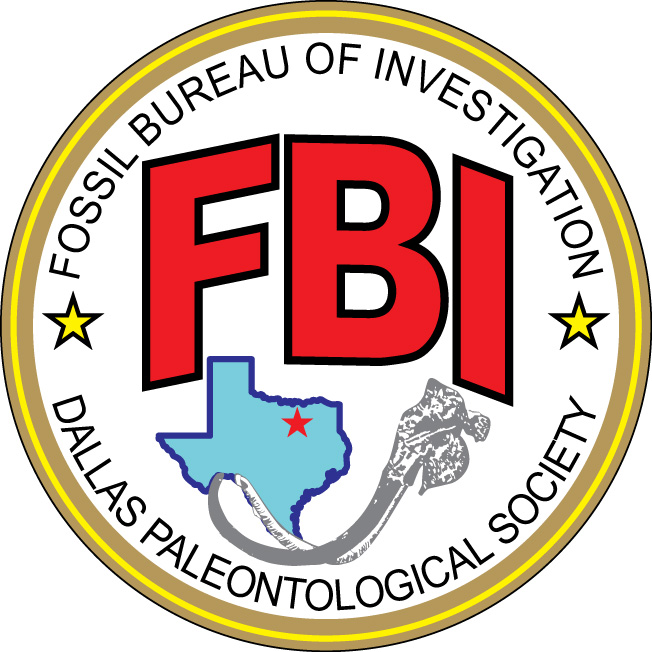MOSS CREEK FIELD TRIP (DPS Members Only)
Saturday, April 13, 2024
The North Sulphur River has long been a favorite fossil destination for hundreds of members and the public, as well. The channeling (straightening) of the river in 1929 has greatly amplified its erosion so that many wonderful paleontological specimens have been exposed and collected. So many that our paleo Society chose to dedicate an entire Occasional Paper book to the various treasures of the NSR. This OP sold out of the original 2000 copies, was beautifully revised by Mark McKinzie (thank you very much) and has been reprinted.
So, with thousands of fossil collectors probing the NSR and all of its tributaries, it was only a matter of time until Moss Creek and its unique selacian (shark and ray) fauna were discovered. It is a clean, narrow creek that is usually wade-able. Stratigraphically, it is in the Menebites danei ammonite zone of the Ozan Member of Campanian Age (Taylor Group), Gulfian Series of the Upper Cretaceous. That makes these shark teeth about 80 myo.
Shark researchers Shawn Hamm and David Cicimurri are writing a paper on Moss Creek. Shawn describes the red beds exposed here as a result of a low-sea level, turbulent environment that was inhabited by small sharks, rays and osteichthyans (bony fish). The conditions must have been a slow-depositional, nutrient-rich habitat because there’s an abundance of shark and ray teeth in this relatively thin interval.
The good news is YOU WILL FIND TEETH - hundreds of gorgeous teeth of many species if you collect and screen properly. The bad news is that most of the teeth are small. A photo of some of the largest teeth you should find is in the April Fossil Record.
The landowners have graciously allowed access to their gated, beautiful and very private property, so a Hold Harmless Agreement is required. Also, there is no group size or age limits, but we’d like to know who’s coming, so please go to the website, www.dallaspaleo.org and sign-up to attend. Your HH Agreement will be sent as a link after registering and receiving meeting directions. Please sign it and bring it with you on that Saturday.
Your collecting success will be dependent on your collecting method. You can go around and pick up a few teeth on the surface or bulk sample and screen later (strongly recommended). Hopefully, the creek will be wet with pools of water for washing sediment. You can use standard screens of ½ then ¼ inch in the field then window screen followed by ½ mm screen at home to capture most of the teeth. A paint strainer (see GOOGLE) is wonderful to collect all sediment below window screen. I plan to take home buckets of sediments for later screening and sorting on hot summer days and cold winter nights.
Dried sediments can be treated with hot vinegar and/or hot water or both to further reduce the volume (to lessen sorting time). This is especially critical for microsorting samples less than 1mm under a microscope.
We’ll provide some 5-gal. buckets BUT start collecting your own buckets now – they’re free. McAlister’s and Jason’s Delis, for instance, throw away dozens of buckets a month – just go in (or eat in) and ask or call them for ‘empty pickle buckets’. They will even save them for you if you’re nice or even tip (I give a $2-bill for 3 or more). Secondary reason here is to keep large, non-biodegradable items like these out of landfills. NEVER BUY BUCKETS! – too many free ones out there.
Roger Farish can address any concerns at rffarish@verizon.net or 972-898-2700 on gameday. As usual, contact the DPS HotLine 817-355-4693 if trip is questionable.
See the April Newsletter for details about this field trip.

 The DPS is a group of professional and amateur paleontologists that want to exchange information, interact, and continue their education in paleontology. We meet once a month on the second Wednesday evening of the month at Brookhaven College, Building H.
The DPS is a group of professional and amateur paleontologists that want to exchange information, interact, and continue their education in paleontology. We meet once a month on the second Wednesday evening of the month at Brookhaven College, Building H.
